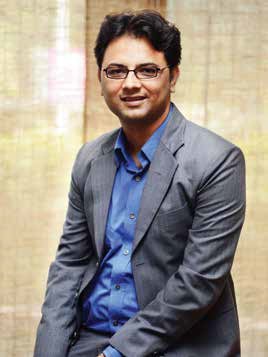
Dr Arun Raizada,Senior Consultant and Head Biochemistry,Department of Laboratory Science, Medanta
| Expertise in free Radicals, Immunology, Cardiac & Cancer Research, Dr Arun Raizada, Senior Consultant and Head Biochemistry, Department of Laboratory Science, Medanta – The Medicity, has vast experience of 38 years in research, teaching and clinical practice. In an interaction with Ekta Srivastava, ENN, Dr Raizada speaks about the technology advances in Clinical Biochemistry considering it an evidence based medicine.
How technology has changed the face of the Clinical Biochemistry Laboratory? |
What is the role of the Medical Laboratory Scientist in Healthcare?
A Medical Laboratory Scientist (MLS), formerly known as a Medical Technologist (MT) or Clinical Laboratory Scientist (CLS), functions as a medical detective, performing laboratory tests that provide physicians with information that assists them in preventing, diagnosing and treating diseases and maintaining patient wellness. The medical laboratory scientist performs a wide variety of laboratory tests, ranging from simple dipstick urine tests to complex DNA tests that help physicians assess risk of diseases. Using test results, physicians can uncover diabetes, cancer, heart attacks, infections and many other diseases. Medical laboratory scientists interact with physicians, nurses, pharmacists, and other members of the healthcare team to provide timely, accurate information so the patient can receive the correct medical treatment.
Medical laboratory scientists use sophisticated biomedical instruments and technology, microscopes, complex electronic equipment, computers, and methods requiring manual dexterity to perform tests on blood, body fluids, and tissue specimens. Clinical laboratory testing sections include clinical chemistry, hematology, Immunohematology (Blood Bank), immunology, microbiology and molecular diagnostics.

What you think about the desirable technology in Clinical Biochemistry?
With the number of testing parameters increasing day by day and with the rising demand from the customers, we need to go in for more automation. Total laboratory automation will be the only solution, because this not only improves turnaround time, but also the quality of results and less dependency on manpower. Therefore, when an institution decides to go for automation, they have to choose the vendors in such a way that all their testing needs are met using minimum number of equipment and also in order to avoid any downtime, similar equipment needs to be provided as back up.
Quality means doing it right whenno one is looking as rightly said byHenry Ford is our first commitmenttowards disease diagnosis”
These advances in testing must have implications for the collaboration between Biochemist and oncologists. Could you describe how you work with oncologists with respect to these tests?
In communicating with our direct patient care colleagues, we discuss the Clinical picture in correlation to laboratory result and the likelihood that additional testing will be needed. Ideally , giving correct diagnosis in protein electrophoresis or Immunofixation it is important that sample integrity is maintained. We discuss certain type of test types have different sensitivity and with respect to Clinical diagnosis if any additional testing or repeat testing is required in near future.
As new tests become available, which is happening at a meteoric pace, we need lead time to implement the testing. We also need to invest the time and effort for the next wave of potential targeted therapies. We are now in an exciting time, where Clinical Biochemistry front and center in terms of personalizing the oncologic care of patients.

Tell us something about Medantas Department of Clinical Biochemistry?
Clinical Laboratory Services of Medanta – The Medicity is a state-ofthe- art department provided with the finest equipment for comprehensive diagnostic support to their clinical counterparts and a patient-centric approach. Biochemistry analysis is one of the most important areas within Clinical Laboratory catering more than 60% of the workload in central Clinical Lab.
The next generation Biochemistry laboratory concentrates not only on routine Clinical Biochemistry test but also on wide range of immunological diagnostic test, latest Acute Kidney injury and Cardiac markers. Apart from this we have wide range of special investigations like protein electrophoresis, Immunofixation, therapeutic drug monitoring and diabetic panel.
Be a part of Elets Collaborative Initiatives. Join Us for Upcoming Events and explore business opportunities. Like us on Facebook , connect with us on LinkedIn and follow us on Twitter , Instagram.










